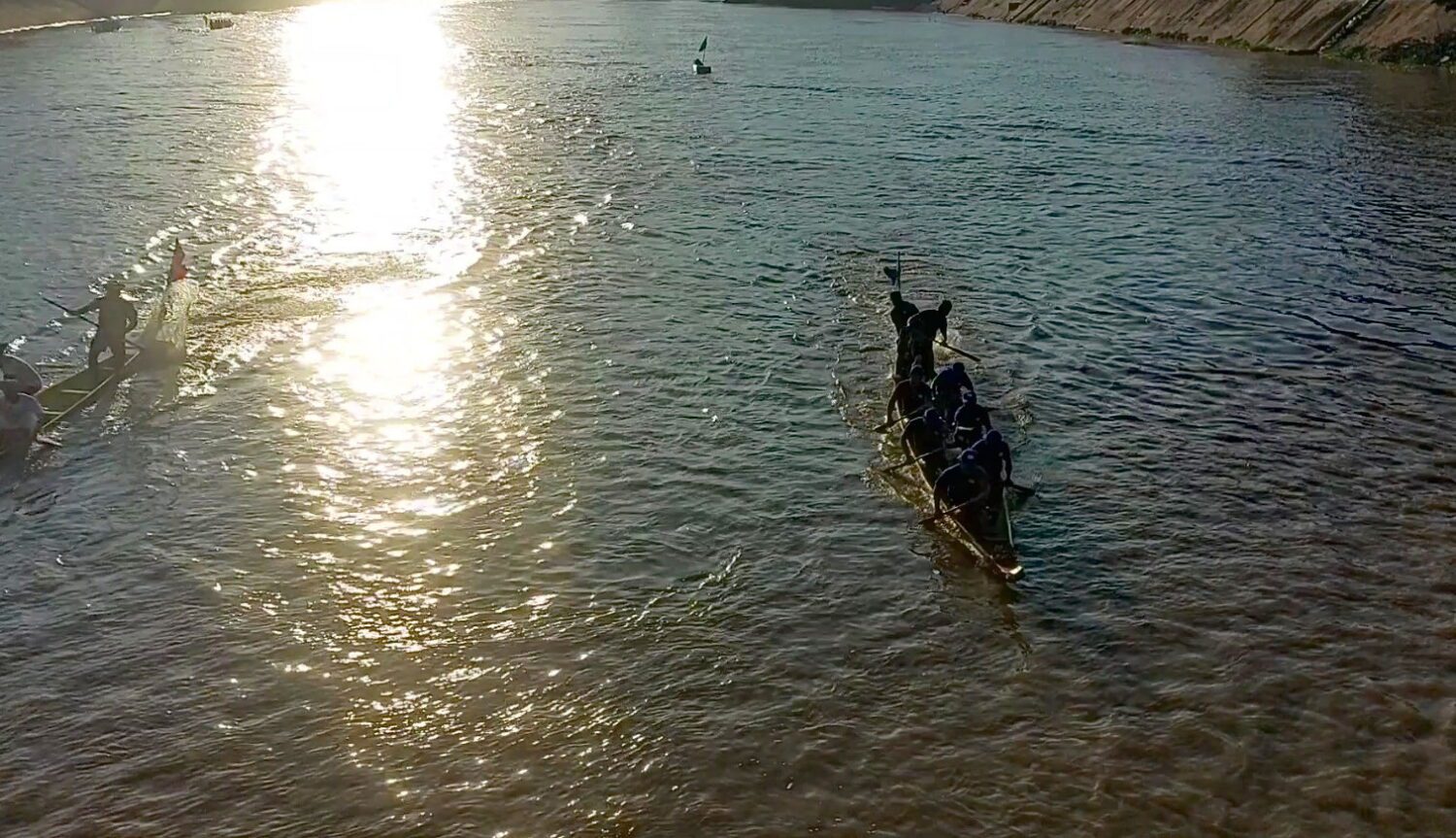CHBAR MON CITY, Kampong Speu — Waters and spirits were high as the annual Water Festival boat races resumed after a two-year hiatus, bringing thousands to the banks of the Prek Tnaut river to watch competitors soar, or sink, through its currents.
Officials canceled the Water Festival in Phnom Penh due to the upcoming Asean Summit, as officials are tightening city security for incoming world leaders. Instead, Kampong Speu blocked off the roads, brought in more police and welcomed thousands into the city.
This was the first Water Festival for Yu Mean, 16, who said she wouldn’t have made the trip out if the festivities were in Phnom Penh.
Mean and her two friends from Kampong Speu’s Odong district leaned on the guardrail and made plans to find fried rice at one of the vendor stalls. She said they would leave before the free concert, where Cambodian rap star VannDa would be performing.
“My parents were concerned about my safety, but I still asked their permission [to go], so I promised to come back before dark,” she said, noting she doesn’t like big crowds anyway.
Bon Om Touk, or the Boat Racing Festival, is a three-day celebration to honor the monsoon season’s end and the beginning of the rice growing season. It also coincides with the change in direction of the Tonle Sap river — which is occurring later than usual due to pressure of hydropower dams and climate change — making Phnom Penh and the Tonle Sap’s riverbanks a natural location.
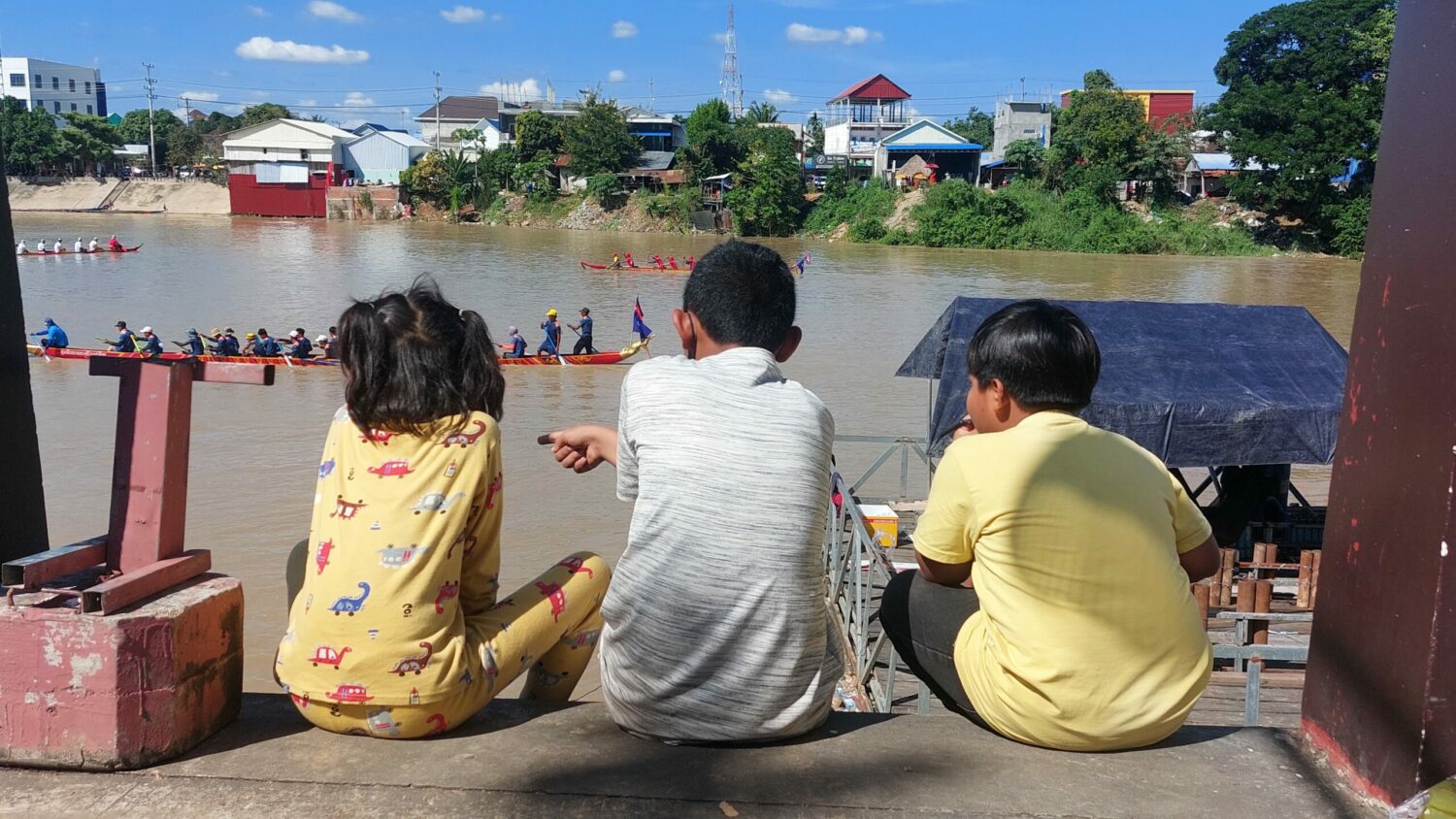 Three children sit on the riverside to watch races during the Water Festival celebration in Kampong Speu’s Chbar Mon city on November 7, 2022. (Danielle Keeton-Olsen/VOD)
Three children sit on the riverside to watch races during the Water Festival celebration in Kampong Speu’s Chbar Mon city on November 7, 2022. (Danielle Keeton-Olsen/VOD) 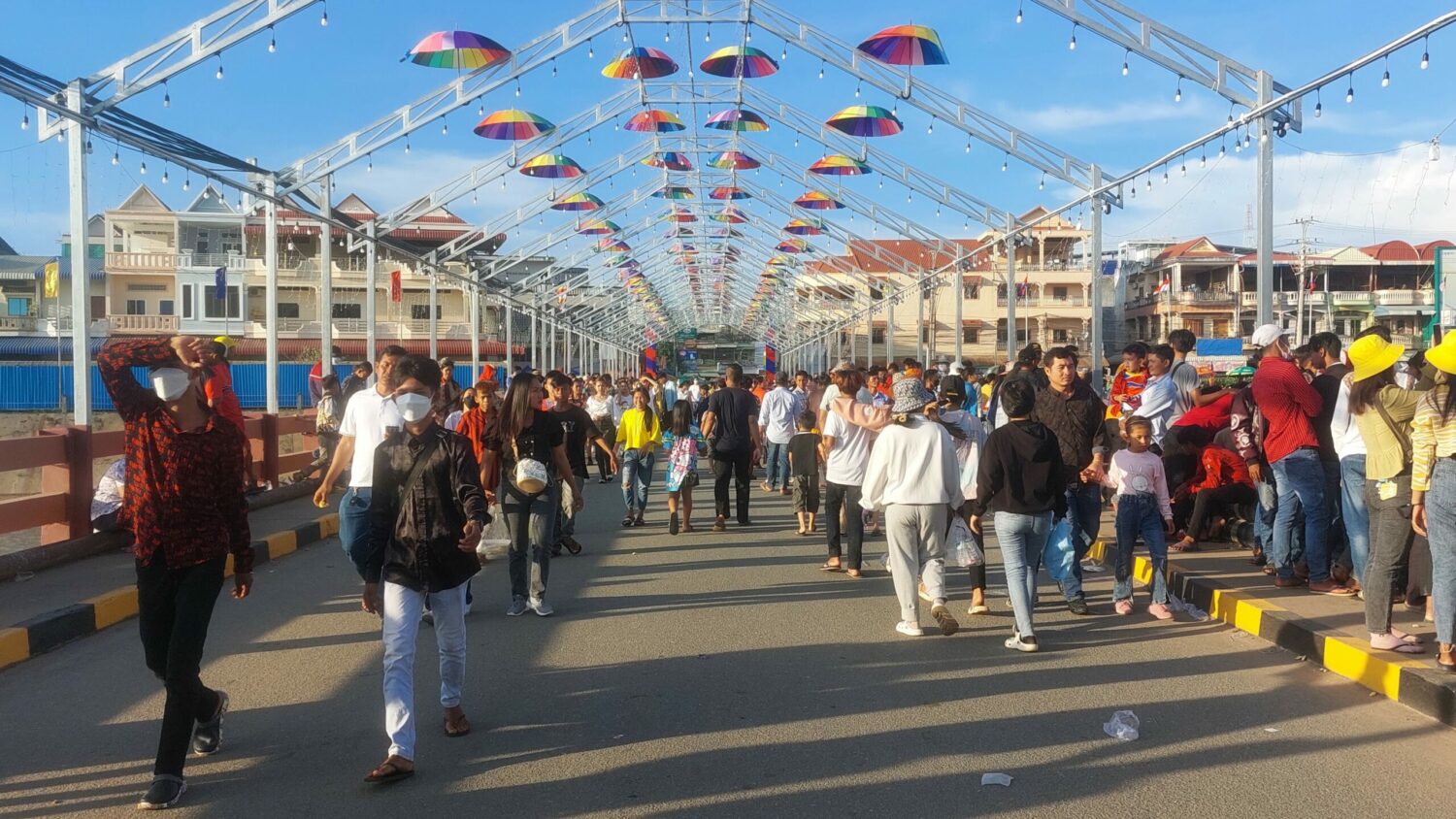 Visitors pass under a decorated Road 143 bridge during the Water Festival celebration in Kampong Speu’s Chbar Mon city on November 7, 2022. (Danielle Keeton-Olsen/VOD)
Visitors pass under a decorated Road 143 bridge during the Water Festival celebration in Kampong Speu’s Chbar Mon city on November 7, 2022. (Danielle Keeton-Olsen/VOD) 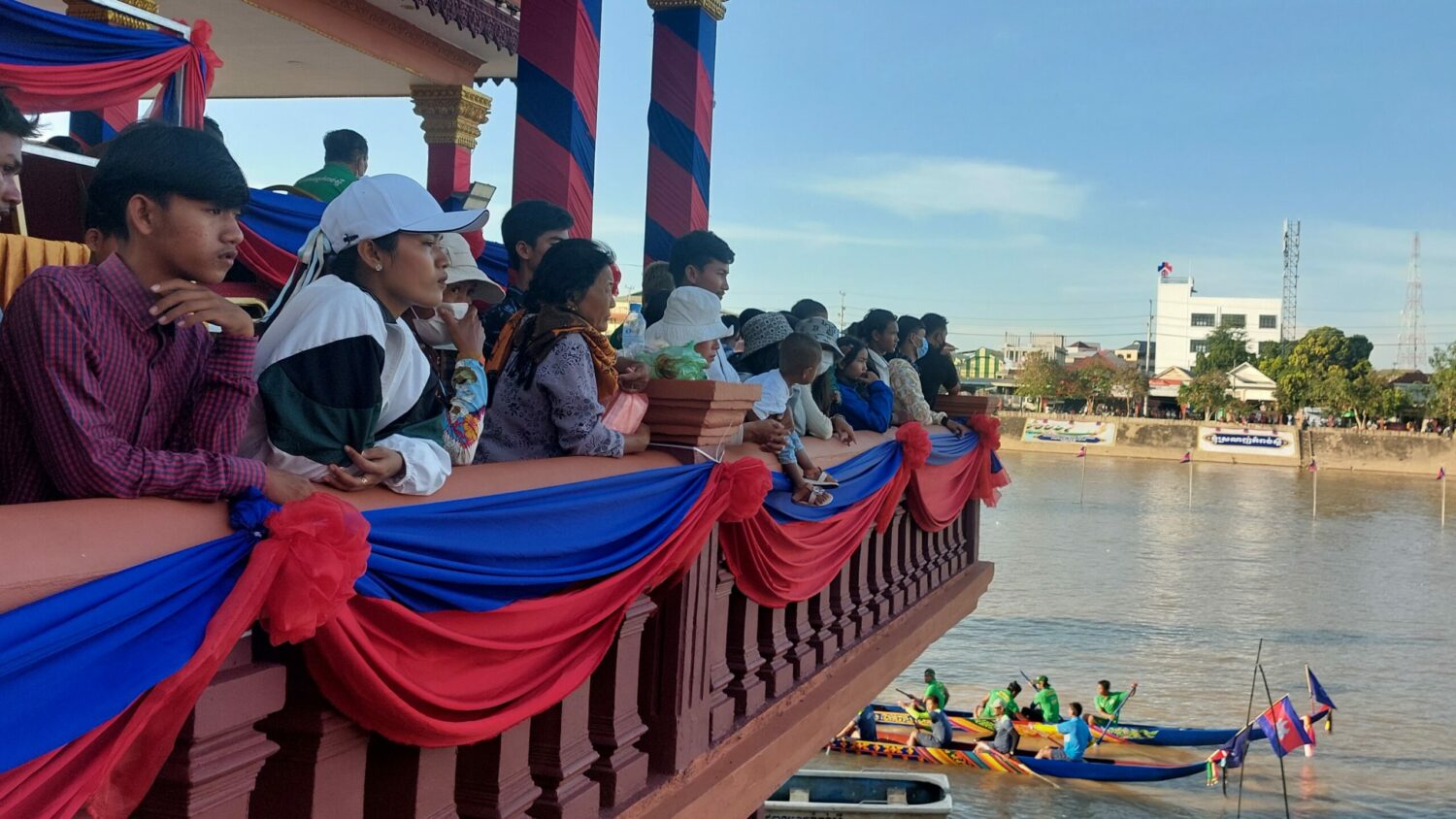 A crowd watches boats race from a pavilion the Water Festival celebration in Kampong Speu’s Chbar Mon city on November 7, 2022. (Danielle Keeton-Olsen/VOD)
A crowd watches boats race from a pavilion the Water Festival celebration in Kampong Speu’s Chbar Mon city on November 7, 2022. (Danielle Keeton-Olsen/VOD) 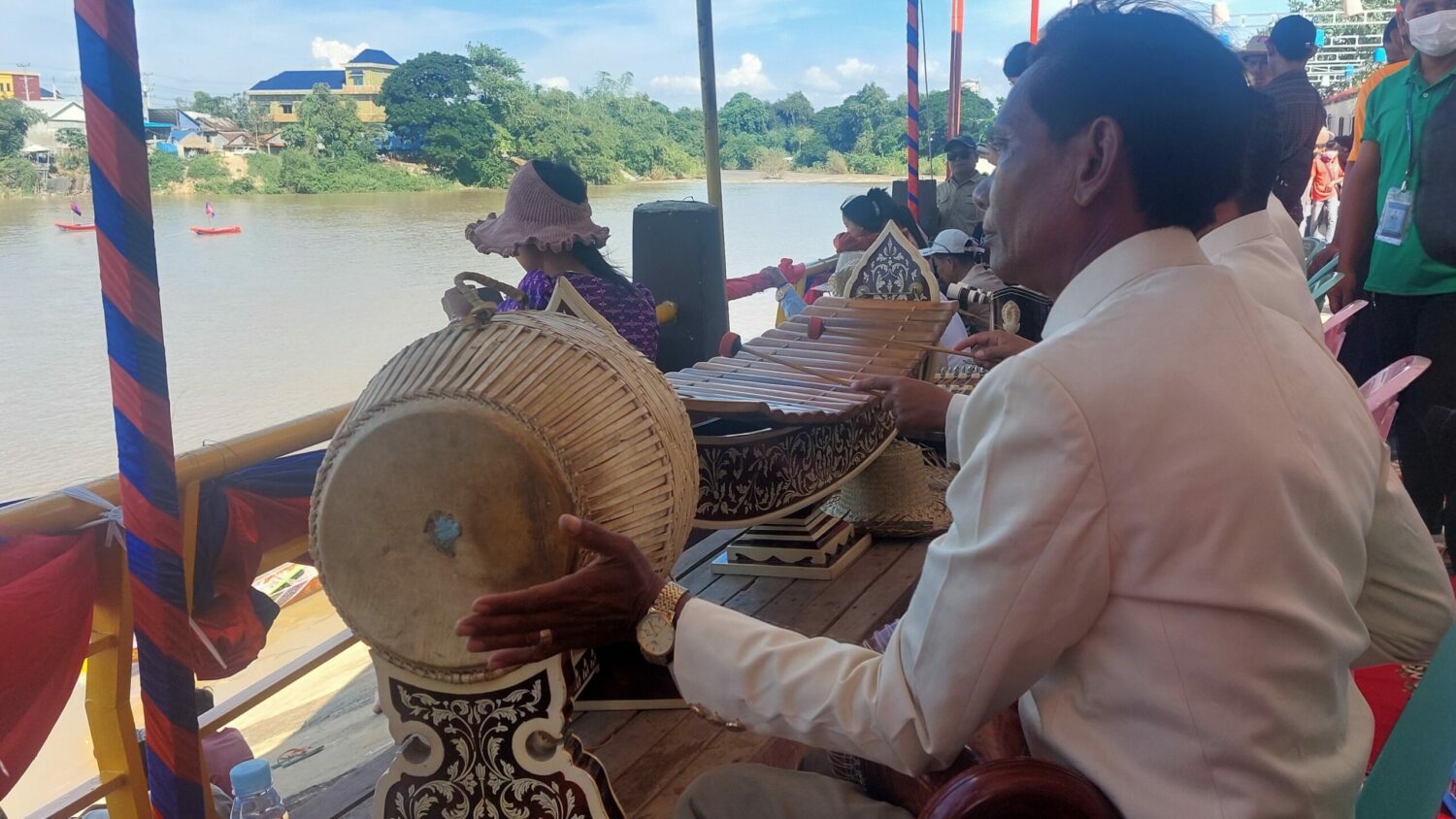 A drummer performs during the Water Festival celebration in Kampong Speu’s Chbar Mon city on November 7, 2022. (Danielle Keeton-Olsen/VOD)
A drummer performs during the Water Festival celebration in Kampong Speu’s Chbar Mon city on November 7, 2022. (Danielle Keeton-Olsen/VOD) Navigating the Prek Tnaut in Kampong Speu is a little more challenging than the Tonle Sap, said Prum Sang, 47, a weathered boat racer from Phnom Penh’s Prek Pnov district.
“I think it’s harder because the water doesn’t push us at all,” said Sang, who had raced in about four previous festivals before Monday’s event. “Because the Phnom Penh river is bigger, it moves us, we can use [the flow].”
Representing Kampong Speu’s telecommunications department, Sang said his team of eight rowers have been training for two weeks prior, mostly to build morale and teamwork among the racers — who chant motivations and team mottos as they carry their long boats to the water, climb in and row into position before their heat begins.
Sang says they also have incentive: The winning boats earn $250 to split among themselves.
“I’m very happy to be back after two years of cancellations. It affects our income too because the ministry pays us,” he said.
Viewers cheered on boats as they crossed the finish line — marked by two small, parked boats manned by one patient judge on each. Children screamed from a ferris wheel spinning deliriously fast.
But not everyone was having an easy time: After selling a half-dozen sticks of taro and durian ice cream to the Kampong Speu provincial administration staff, vendor Song Khem, 47, sat on a curb hedging the grass in Chuon Nath park, away from the race.
“Right now my leg hurts so much I’m not sure I’m going to sell tomorrow. I might go home,” she said.
Khem came from Kampong Chhnang province to sell ice cream, as her niece owns a franchise and hires her to sell at different festivals. Most of the time, she works as a farmer, but her family eats all the rice they grow — none is sold for profit.
“Selling ice cream is a better job because at least I get a little or a lot of profit. It depends on the customers,” she said.
Dozens of vendors milled among the crowds with baskets of snacks or a bouquet of balloons, and dozens more were corralled in neat lines of stalls on both the north and south sides of the Prek Tnaut river.
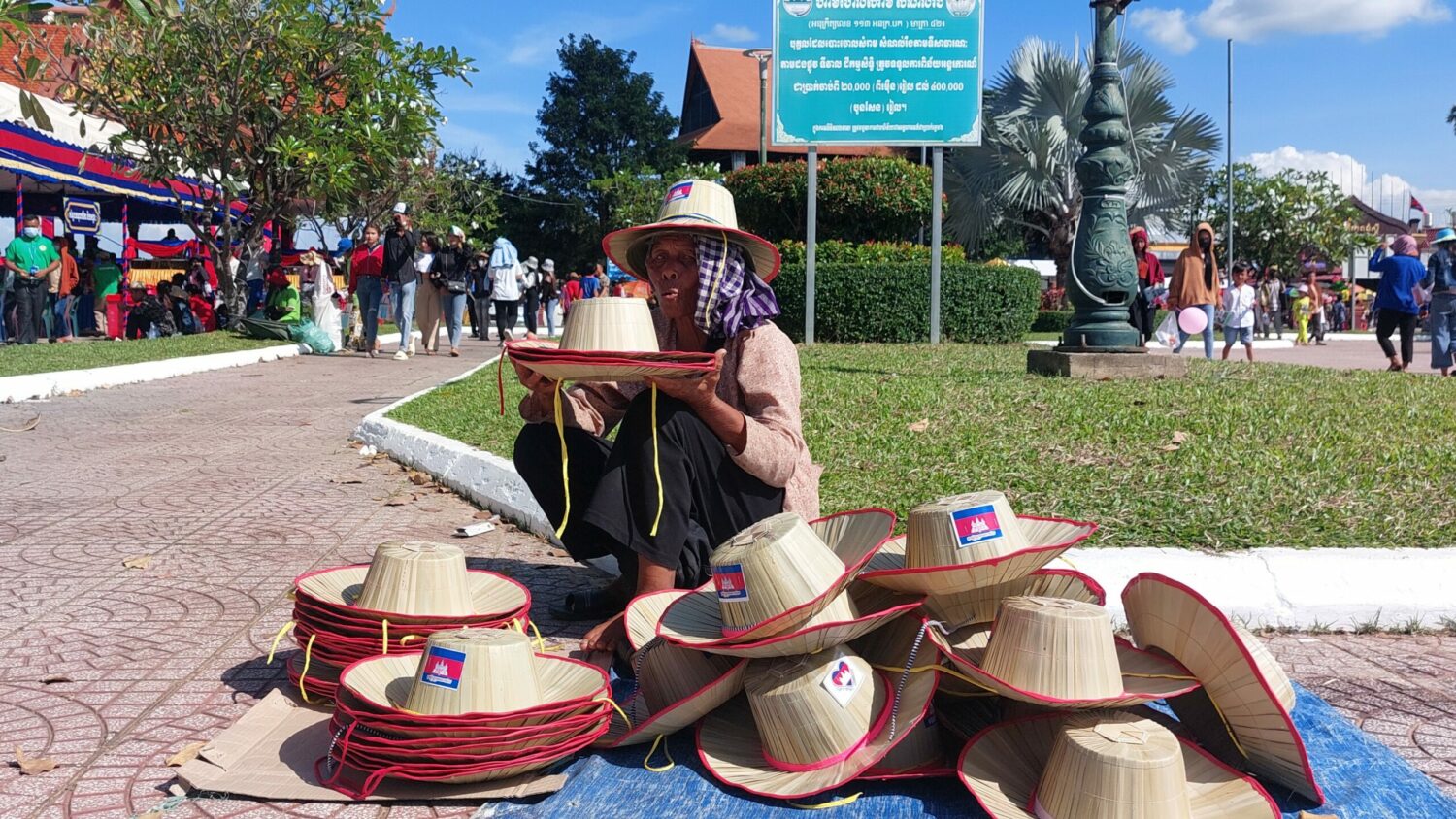 A vendor holds up straw hats with Cambodian flags she sells the Water Festival celebration in Kampong Speu’s Chbar Mon city on November 7, 2022. (Danielle Keeton-Olsen/VOD)
A vendor holds up straw hats with Cambodian flags she sells the Water Festival celebration in Kampong Speu’s Chbar Mon city on November 7, 2022. (Danielle Keeton-Olsen/VOD) 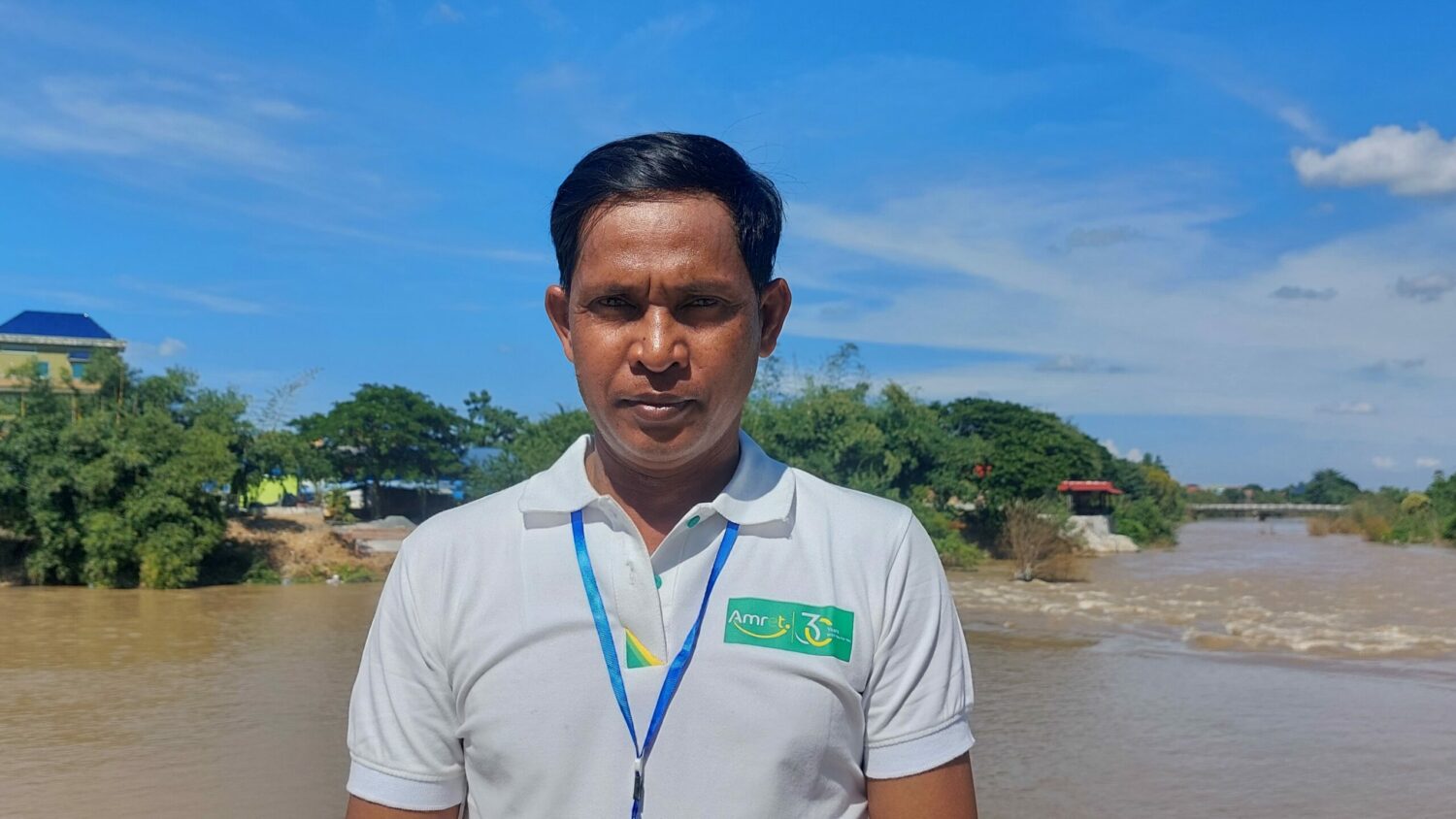 Boat race participant Prum Sang, 47, in Chbar Mon city on November 7, 2022. (Danielle Keeton-Olsen/VOD)
Boat race participant Prum Sang, 47, in Chbar Mon city on November 7, 2022. (Danielle Keeton-Olsen/VOD)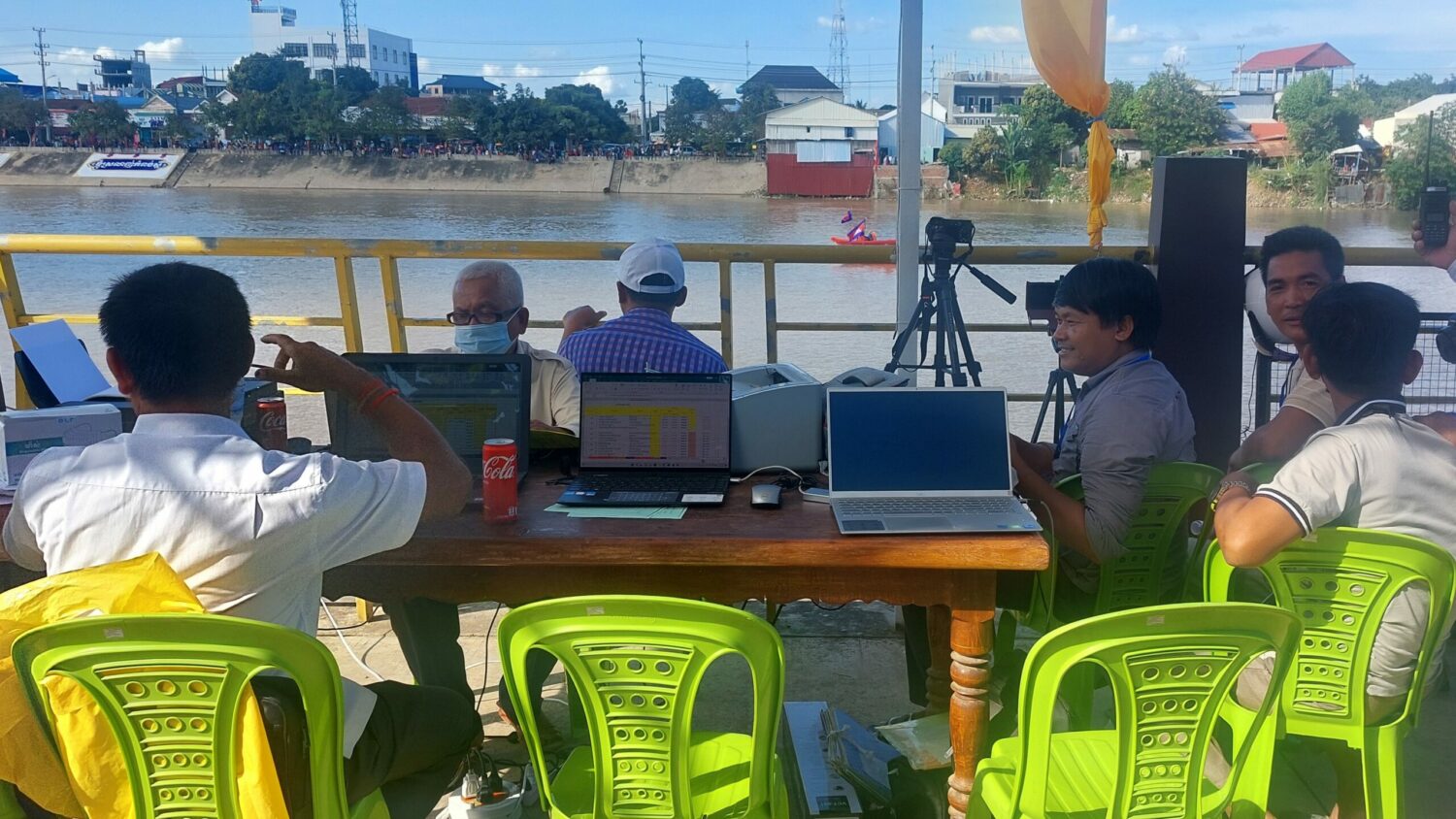 Boat race judges sit at computers on a table at the Water Festival celebration in Kampong Speu’s Chbar Mon city on November 7, 2022. (Danielle Keeton-Olsen/VOD)
Boat race judges sit at computers on a table at the Water Festival celebration in Kampong Speu’s Chbar Mon city on November 7, 2022. (Danielle Keeton-Olsen/VOD) 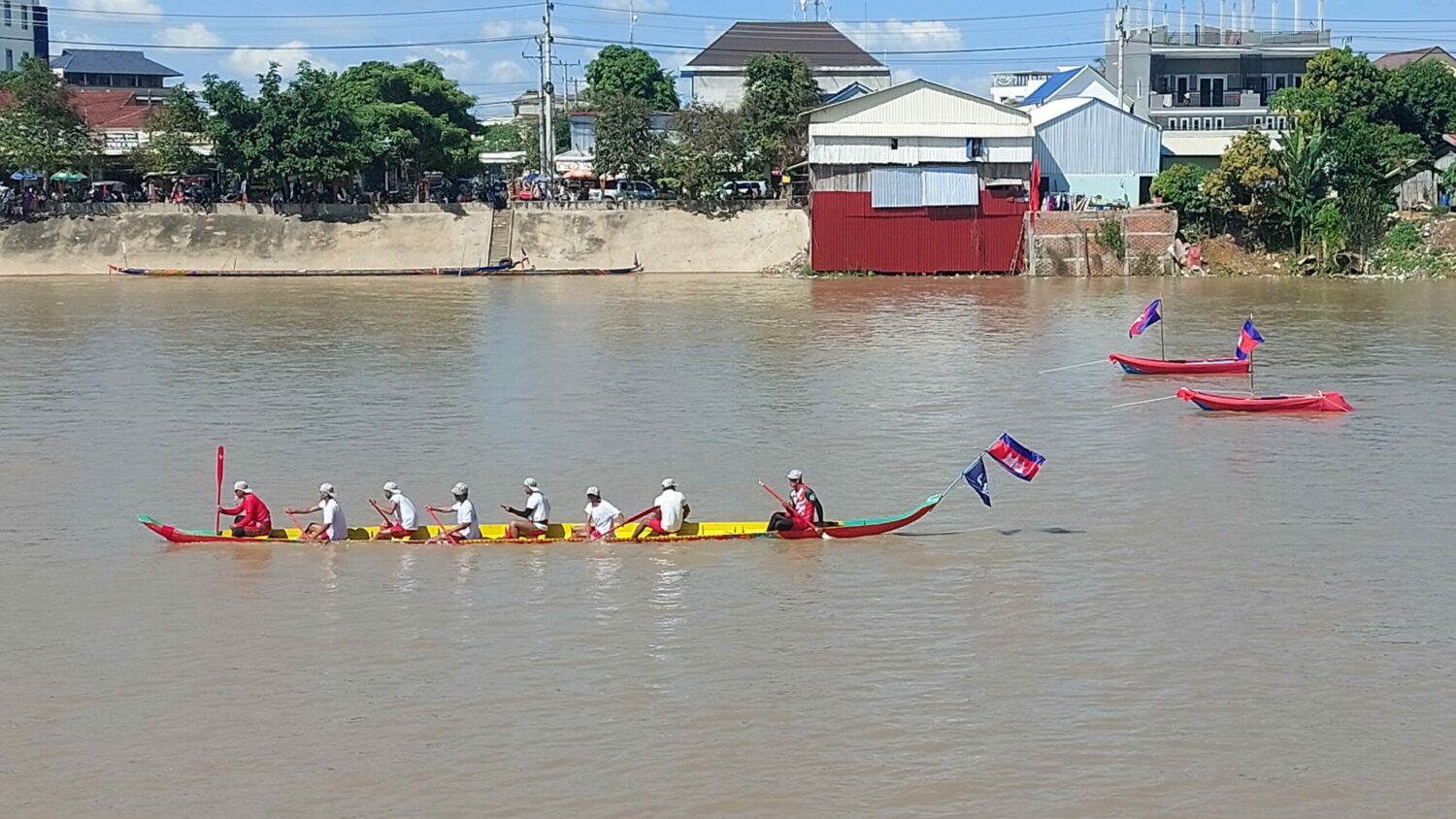 A team of boat racers pass through the Prek Tnaut river during the Water Festival celebration in Kampong Speu’s Chbar Mon city on November 7, 2022. (Danielle Keeton-Olsen/VOD)
A team of boat racers pass through the Prek Tnaut river during the Water Festival celebration in Kampong Speu’s Chbar Mon city on November 7, 2022. (Danielle Keeton-Olsen/VOD) The boat races began at 3 p.m. to cheers through the heavy heat of an unblocked afternoon sun, and crowds leaning over the guardrails and walking across the Road 143 bridge increased as the sun lowered.
The crowd was mellow but content, and a little drama — when racers were neck-and-neck — sent them to cheers.
Before the races, a man intoned into a loudspeaker that Kampong Speu province provided $100,000 to support the festivities, the most of any sponsor. A handful of oknha, companies and other figures also contributed a few hundred to a few thousand dollars.
Duy Sophat, a boat-race judge who works as a teacher, said the racers were contesting for a $250 prize, but that was a baseline: Sponsors often added to the pot, and the last boat race in Phnom Penh in 2019 had a total price of 5 million riel, over $1,200.
Sophat said there were no winners on Monday, instead the competitors were racing the clock. Each boat’s time to complete a lap, from beyond the bridge to the two parked boats and back again, was tallied, and the boat with the shortest time would win.
Usually, racers in Phnom Penh compete in an “international” style boat, but Sophat said that in Kampong Speu other types of boats, such as a palm-wood boat, were able to race.
After competitors in the second match soared past the judges’ boats, the slower team’s boat began sinking into the water. Two rescue boats raced out to toss tires to the team, which was representing the Union of Youth Federation of Cambodia in Kampong Speu province. A few racers got to shore quickly, but several were thrust into a section of rapids downstream of the race, clinging to plants and trees growing in the water to stop themselves from tumbling onward.
A member of the judging team later told VOD that everyone was rescued.
“Just after we saw their competitor win, we saw them sinking,” said Mao Vichet, 68, who watched the racers struggle a few hundred meters from the rapids.
He said the rain was very strong in the previous few days, so the Prek Tnaut river was higher on the day of the race.
A farmer from Kampong Speu’s Samraong Tong district, Vichet, said he doesn’t go out much and didn’t know anyone competing in the races, but he was happy to be among the larger crowds in his home province.
“There’s so many people on the bridge, before the Water Festival had a lot fewer people,” he said. “This year, I enjoyed it more than the previous years, as people have the free time because they haven’t started rice farming yet.”


